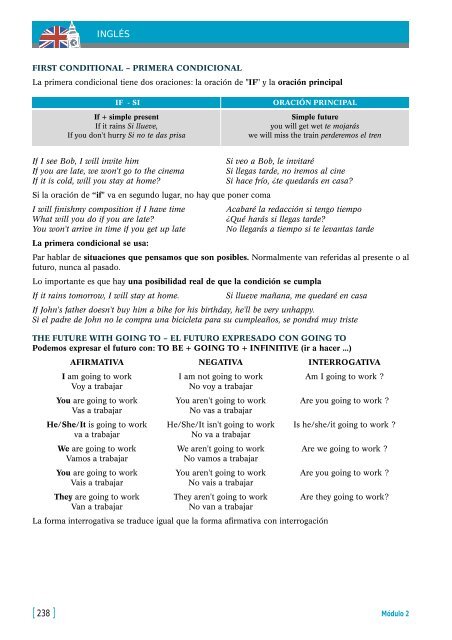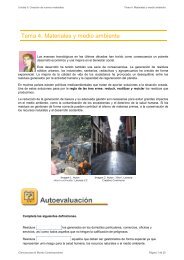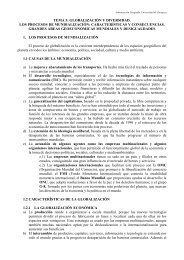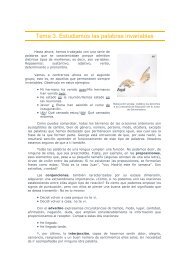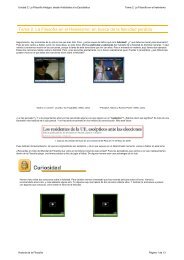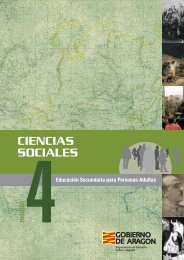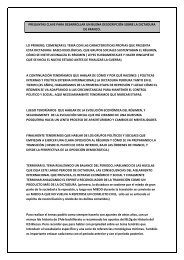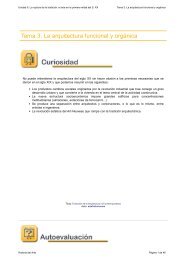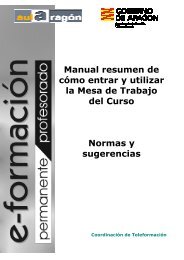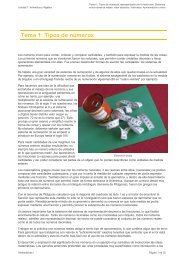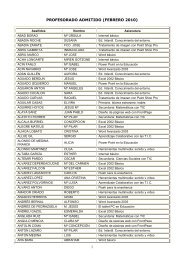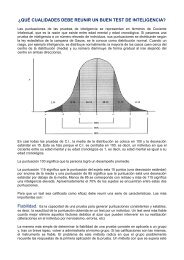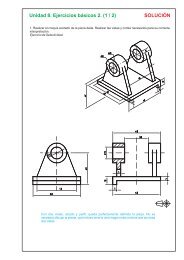Educación Secundaria para Personas Adultas 2módulo - aulAragon
Educación Secundaria para Personas Adultas 2módulo - aulAragon
Educación Secundaria para Personas Adultas 2módulo - aulAragon
You also want an ePaper? Increase the reach of your titles
YUMPU automatically turns print PDFs into web optimized ePapers that Google loves.
INGLÉS<br />
FIRST CONDITIONAL – PRIMERA CONDICIONAL<br />
La primera condicional tiene dos oraciones: la oración de "IF" y la oración principal<br />
IF - SI<br />
If + simple present<br />
If it rains Si llueve,<br />
If you don't hurry Si no te das prisa<br />
ORACIÓN PRINCIPAL<br />
Simple future<br />
you will get wet te mojarás<br />
we will miss the train perderemos el tren<br />
If I see Bob, I will invite him<br />
Si veo a Bob, le invitaré<br />
If you are late, we won't go to the cinema<br />
Si llegas tarde, no iremos al cine<br />
If it is cold, will you stay at home?<br />
Si hace frío, ¿te quedarás en casa?<br />
Si la oración de “if" va en segundo lugar, no hay que poner coma<br />
I will finishmy composition if I have time<br />
Acabaré la redacción si tengo tiempo<br />
What will you do if you are late?<br />
¿Qué harás si llegas tarde?<br />
You won't arrive in time if you get up late<br />
No llegarás a tiempo si te levantas tarde<br />
La primera condicional se usa:<br />
Par hablar de situaciones que pensamos que son posibles. Normalmente van referidas al presente o al<br />
futuro, nunca al pasado.<br />
Lo importante es que hay una posibilidad real de que la condición se cumpla<br />
If it rains tomorrow, I will stay at home.<br />
Si llueve mañana, me quedaré en casa<br />
If John's father doesn't buy him a bike for his birthday, he'll be very unhappy.<br />
Si el padre de John no le compra una bicicleta <strong>para</strong> su cumpleaños, se pondrá muy triste<br />
THE FUTURE WITH GOING TO – EL FUTURO EXPRESADO CON GOING TO<br />
Podemos expresar el futuro con: TO BE + GOING TO + INFINITIVE (ir a hacer ...)<br />
AFIRMATIVA NEGATIVA INTERROGATIVA<br />
I am going to work I am not going to work Am I going to work ?<br />
Voy a trabajar<br />
No voy a trabajar<br />
You are going to work You aren't going to work Are you going to work ?<br />
Vas a trabajar<br />
No vas a trabajar<br />
He/She/It is going to work He/She/It isn't going to work Is he/she/it going to work ?<br />
va a trabajar<br />
No va a trabajar<br />
We are going to work We aren't going to work Are we going to work ?<br />
Vamos a trabajar<br />
No vamos a trabajar<br />
You are going to work You aren't going to work Are you going to work ?<br />
Vais a trabajar<br />
No vais a trabajar<br />
They are going to work They aren't going to work Are they going to work?<br />
Van a trabajar<br />
No van a trabajar<br />
La forma interrogativa se traduce igual que la forma afirmativa con interrogación<br />
[ 238 ] Módulo 2


